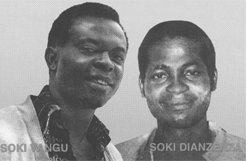|
 Bella Bella, popular Congolese rumba band, formed 1970; disbanded, 1980. Notable early members: Jean Bosco Bayabo (born Congo-Kinshasa, Jan. 25, 1947; guitar), Pierre Bissikita (born Congo-Kinshasa; guitar), Emmanuel "Shaba" Kahamba Uzalu (born Kinshasa, Aug. 1, 1947; died Holland, Apr. 18, 2016; bass), "Barly" Kalala Tshiaba (born Congo-Kinshasa, 1952; bass), "Billy Barrel" Ngoma Nzita (born Kinshasa, 1946; died Liège, Belgium, Dec. 21, 1978;vocal), Jean Roger Ntete (born Congo-Kinshasa; guitar), Emile Soki Dianzenza (born Kinshasa, Dec. 14, 1954;died Kinshasa, May 4, 1990;vocal), Maxime Soki Vangu (born Kinshasa, Aug. 8, 1947;died Cologne, Germany, May 18, 1990;vocal), Tedia Wunumbakidi (born Kimbanda, Congo-Kinshasa, Dec. 16, 1947;vocal). Bella Bella, popular Congolese rumba band, formed 1970; disbanded, 1980. Notable early members: Jean Bosco Bayabo (born Congo-Kinshasa, Jan. 25, 1947; guitar), Pierre Bissikita (born Congo-Kinshasa; guitar), Emmanuel "Shaba" Kahamba Uzalu (born Kinshasa, Aug. 1, 1947; died Holland, Apr. 18, 2016; bass), "Barly" Kalala Tshiaba (born Congo-Kinshasa, 1952; bass), "Billy Barrel" Ngoma Nzita (born Kinshasa, 1946; died Liège, Belgium, Dec. 21, 1978;vocal), Jean Roger Ntete (born Congo-Kinshasa; guitar), Emile Soki Dianzenza (born Kinshasa, Dec. 14, 1954;died Kinshasa, May 4, 1990;vocal), Maxime Soki Vangu (born Kinshasa, Aug. 8, 1947;died Cologne, Germany, May 18, 1990;vocal), Tedia Wunumbakidi (born Kimbanda, Congo-Kinshasa, Dec. 16, 1947;vocal).
Orchestre Bella Bella was largely the creation and the instrument of the singing brothers Soki. Older brother Soki Vangu had been a university student in Lubumbashi. The younger Soki Dianzenza had won a 1969 singing competition at age fourteen. Each failed in his first attempt to form a sustainable band; together they succeeded with Bella Bella.
From its debut the group was a hit with younger Congolese and became a part of the so-called "youth band" movement that challenged the supremacy of Kinshasa's more established bands. Bella Bella, whose personnel changed repeatedly, played the conventional Congolese rumba but with a rougher, less polished sound than the elders. Early songs, mostly written by Dianzenza, like "Lisolo" (negotiations) and "Lina" (a girl's name), explored the vicissitudes of romance through teen-aged eyes.
Sibling rivalry and Dianzenza's fickle behavior led to several splits within the band. In 1971 Dianzenza left to form the short-lived Super Bella Bella. The next year he launched the more successful Bella Mambo anchored by guitarist Dino Vangu. Meanwhile Soki Vangu signed Bella Bella with the Vévé label of producer Verckys Kiamuangana. At Vévé, future greats Nyboma Mwan Dido, later of the Quatre Etoiles, and Pepe Kalle joined Soki Vangu to form the group's strongest vocal trio.
Bella Bella left Vévé in 1973 losing Nyboma and Kalle in the process. Dianzenza returned for another productive period beside his brother, and the two started their own labels. Hits from 1974 included Vangu's "Zamba" (forest), a song with political overtones, and Dianzenza's humorous tale of suspected infidelity, "Kamavasthy."
Dianzenza re-started Bella Mambo in 1975, a formation that would eventually include future stars Kanda Bongo Man and Diblo Dibala. Bella Bella continued under Vangu's leadership, but it gradually began to founder. The brothers reunited for the last time toward the end of the seventies.
At its peak in the mid-seventies, Bella Bella was one of Congo-Kinshasa's most popular bands. Although it was part of a youth movement that included Zaiko Langa Langa and a number of other groups, Bella Bella stayed close to the conventional rumba. Where Zaiko dropped the horn section and played with raucous abandon, Bella Bella kept the horns and produced a smoother sound. When together, the brothers Soki were a formidable duo with broad appeal. Their disharmony off-stage proved to be Bella Bella's undoing.
© 2011 Gary Stewart
SELECT DISCOGRAPHY
Bella Bella des Frères Soki (Sonodisc CD36541) seventies recordings reissued 1994; Les Plus Grand Succès de l'Orchestre Bella Bella (vols. 1-5, Ngoyarto NG029-032 & NG049) seventies recordings reissued 1997; Frères Soki & Bella Bella (Sonodisc CD36602) seventies recordings reissued 1998.
SELECT BIBLIOGRAPHY
Manda Tchebwa, Terre de la chanson (Louvain-la-Neuve, Belgium, 1996); M. Sinnock, "Les Frères Soki," The Beat (vol. 17, no. 2, 1998); G. Stewart, Rumba on the River (London and New York, 2000).
|

